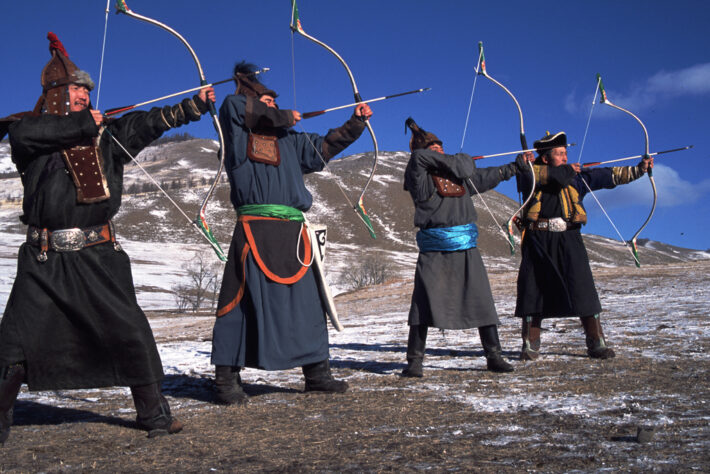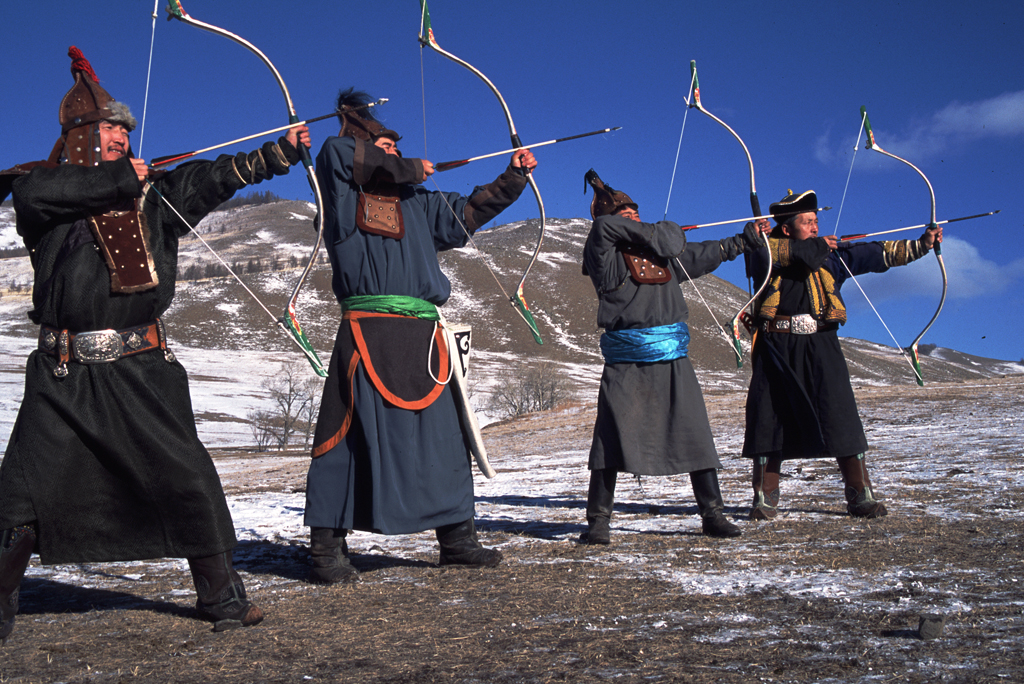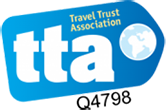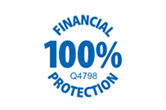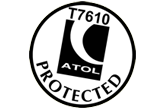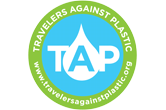Money
Currency is the Tugrik. Foreign currency can be exchanged at the airport on arrival or in local banks in Ulaanbaatar. Official organisations authorised to exchange foreign currency include commercial banks in Ulaanbaatar and bureaux de change at certain hotels. The easiest currency to exchange is the US Dollar and Russian Rouble. Chinese money is not welcomed. Credit/debit cards and ATM’s: Accepted by main commercial banks, large hotels and a few shops and restaurants in Ulaanbaatar. ATMs are only available in Ulaanbaatar and may be used with credit/debit cards.
Tipping
Tipping is not a local custom in Mongolia; it is common only amongst tourists and expatriates who live in the country. Giving monetary gifts to friends or relatives is common, however, both in the city and in the countryside. As tourism is growing in the country locals who work in the tourism industry are getting used to the notion of tipping and sometimes even expecting a tip from clients. Some locals still feel embarrassed to receive large tips from foreigners. Nomads understands that after a trip clients want to show their gratitude to all staff in the form of a tip but we ask that this is done with care and moderation. Tips will vary depending on the length and complexity of the trip, the number of staff on the trip and the number of clients on the trip. Generally groups like to meet together before the end of the trek to discuss how much they would like to tip each staff member based on their individual trek experience.
Passports & Visas
Visas requirements for Mongolia are rather complicated and dependent not only on Nationality but also on the route you fly in to the country. As a general rule British visitors do need a visa whilst American visitors do not for visits under 30 days in duration. However we recommend you contact the Mongolian Embassy in your country of residence in order to check.
It is your responsibility to ensure that your passport has a minimum of 6 months validity before start of travel and that your visa requirements are met. If you would like some advice on where to find up to date information for each country’s entry requirements and how to organise your visas, please do not hesitate to contact us.
Immunisation
Required vaccinations and health risks can vary greatly from country to country and region to region. It is strongly recommended that you arrange a visit to your GP, or ideally a specialist travel clinic, prior to your trip. We are unfortunately not qualified to advise you on specific medical requirements. Taking along a copy of your itinerary can be helpful for doctors to identify the areas you may visit.
Client Code of Conduct
Cultural
The cultural and societal norms of the Mongolian peoples have been established and adhered to because they have worked for this group of people over a long period of time. As a visitor to these people, clients are expected to respect the language, social norms and ways of daily living of the local people. While clients may disagree with and decline to participate in some activities or areas of interactions, clients behaviour must not conflict with or be disrespectful to local people, their culture or religion, customs or practices.
Clothing
Clients are expected to wear clothing appropriate to the local norms and values. It is not expected that clients will have to wear local clothing, although people often do. It is expected that clients will wear clothing (and enough of it) that is acceptable to local societal standards. Generally clients are expected to avoid wearing revealing clothing, to avoid being nude in the presence of local people and to respect local customs and religious beliefs when visiting important buildings or sites or attending local events. Mongolians are generally well-dressed people and they take a lot of care in their appearance.
Language
Participation in learning and speaking the local language is almost always appreciated. Especially learning the names of the local Mongolian staff and being able to say them properly. We encourage clients to learn as much of the local language as possible and to use it. Although English is increasingly becoming a common language in many corners of the world, you should not expect that people you are interacting with would be able to use it, understand it, or respond to its use.
Food
Local food is always different from your normal diet. Mongolians eat a lot of meat and dairy products and it is food of this basis that you will be offered in the local nomadic people’s gers. Many of the local people will offer food generously and it is often one of the only material items they have to give to you. Accept food and at least try some of it but take only small amounts. Do not abuse the kindness and generosity of the host. Offering your own food in return is often appreciated.
Drink
In the gers in the countryside you will either be offered milky, salty tea or black tea. Your bowl will continually be refilled if you keep placing it down empty so if you do not want any more then place your hand over the top of the bowl as a sign that you have finished. Alcoholic drinks will either be ‘airag’ or fermented mare’s milk (which does more damage to your stomach than head if taken in large quantities!) or vodka. In both cases, be careful. All alcoholic drinks should be taken in extreme moderation.
Ger Etiquette
The Mongolian ger is the traditional home of the nomadic people and has been since the days of Genghis Khan. Thankfully, for foreigners, the customs of a ger since those times have become less rigid, still it is a good idea to be aware of certain rules and customs when visiting a ger. Mongolians are extremely generous and welcoming in their nature and do not expect foreign visitors to know all of the local customs, however, we believe it is common courtesy to become acquainted with some of these customs and try to follow them as much as possible.
Please remember that you are a guest in someone’s home and as such behave with the appropriate consideration and respect to your hosts.
The Mongolian ger is the focal point for the nomadic people’s family and social life. Any guest who cares to pay the family a visit will be greeted warmly and immediately offered a cup of tea. Guests should enter the ger, without knocking, and step over the threshold with their right foot. Guests are traditionally sat on the left hand side of the ger, while the host will sit at the top of the ger. Often the family would like to place their guests in the honoured position at the top of the ger and it is acceptable to accept this honour. Once seated you will be offered tea by your host, accept the tea with you right hand, with you left hand placed under the elbow of your right arm to support it. As a sign of respect always make sure your sleeves are rolled down if you have a long sleeved shirt on. After tea, food will often be offered. This is usually placed in large bowls in the middle of the ger and guests are requested to help themselves. If it is a special occasion home made vodka or ‘airag’ (fermented mare’s milk) will be offered. Usually this is done by the host sitting in the middle of the ger and passing one cup out to his guests. The guest should drink from the cup and then return it to the host. It is appropriate if you place your ring finger of your right hand in the bowl before drinking and three times, offering the vodka, symbolically, to the gods, by sprinkling it in the air.
If you would like to walk around the ger please do so in a clock-wise direction and never across the middle of the ger. Please never step over food or someone’s feet. It is acceptable to take photos in a ger but
ask your host before doing so. When leaving the ger it is appropriate to offer the host a small gift in appreciation for the hospitality offered.
Environmental – please remember the following:
• Dispose of all garbage (refuse) including cigarette buts and matches and any paper or plastic scraps. We avoid any on site disposal of garbage and provide adequate bins for clients to dispose of any waste. They will be disposed of properly at the end of the trip
• Care will be taken to maintain he purity of all the water on the trip. When washing in the rivers of streams never soap and shampoo in the water. The water in Mongolia is pristine and we would like to keep it that way. All clients are provided with a bowl for washing – this should be used for washing rather than the stream or river itself. It is a good idea to bring bio- degradable washing products if possible. All food scraps and soap will be kept out of streams, lakes and other bodies of water.
• Vehicles will stay on established roads and tracks wherever possible. When driving cross country care will be taken to minimise grassland damage and avoid wetlands.
